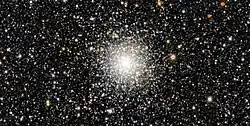| NGC 6356 | |
|---|---|
 NGC 6356 as seen through the Hubble Space Telescope | |
| Observation data (J2000 epoch) | |
| Constellation | Ophiuchus |
| Right ascension | 17h 23m 35.0s |
| Declination | −17° 48′ 47″ |
| Apparent magnitude (V) | 8.2 |
| Apparent dimensions (V) | 10.00 |
| Physical characteristics | |
| Absolute magnitude | -8.51 |
| Metallicity | = -0.4[1] dex |
| Other designations | GCL 62 and ESO 588-SC1 |
NGC 6356 is a globular cluster located in the constellation Ophiuchus. It is designated as a II in the Shapley–Sawyer Concentration Class and was discovered by the German-born British astronomer William Herschel on 18 June 1784. The star cluster is more dense and bright towards the middle. NGC 6356 is located 80' north east of the brighter NGC 6333. It is at a distance of 49,600 light years away from Earth.[2][3][4][5][6]
The cluster is relatively metal-rich and therefore has a large amount of interstellar dust in its core.[1]
See also
References
- 1 2 Dust in the core of the metal-rich globular cluster NGC 6356
- ↑ "Object No. 1 - NGC 6356". NASA/IPAC extragalactic database. NASA/IPAC. Retrieved 19 October 2015.
- ↑ "Revised NGC Data for NGC 6356". Seds. Retrieved 19 October 2015.
- ↑ "NGC 6356 (= GCL 62)". cseligman. Retrieved 19 October 2015.
- ↑ "NGC 6356". Seds. Retrieved 19 October 2015.
- ↑ "The globular cluster NGC 6356". In-the-sky. Retrieved 19 October 2015.
External links
 Media related to NGC 6356 at Wikimedia Commons
Media related to NGC 6356 at Wikimedia Commons
This article is issued from Wikipedia. The text is licensed under Creative Commons - Attribution - Sharealike. Additional terms may apply for the media files.